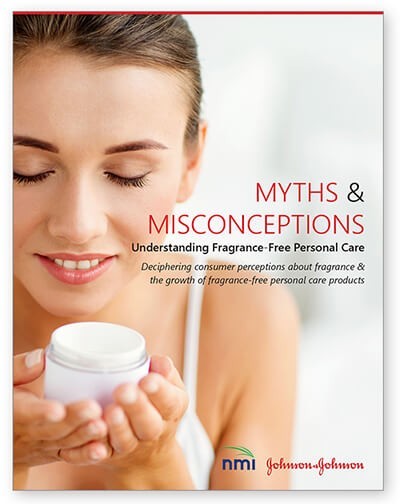NMI/Johnson and Johnson Releases New Fragrance Report

For Immediate Release
HARLEYSVILLE, PA. June 2018

NMI (Natural Marketing Institute) a leading research and global intelligence provider to brands and corporations, in collaboration with Johnson and Johnson Consumer Inc., is pleased to present its NMI /Johnson and Johnson Consumer Inc. Fragrance report
MYTHS & MISCONCEPTIONS
Understanding Fragrance-Free Personal Care
Deciphering consumer perceptions about fragrance and the growth of fragrance-free personal care products
Abstract
The use of fragrance can be an important purchase driver in many consumer product categories, especially personal care. Fragrances and scents are thought to provide an emotional connection to a product and higher brand engagement. Over the last decade, increasing scrutiny of many ingredients has consumers expressing concern that fragrance compounds may be responsible for potential sensitivities or reactions and that they should be avoided. These perceptions are causing consumers to increasingly seek out products that are free of fragrances, and as a result, the fragrance-free product category has seen growing momentum for the last five years.
To gain insight on how this segment is evolving and what ingredients might be of true concern, Johnson and Johnson Consumer Inc. partnered with the Natural Marketing Institute on a multi-phase research project. The first phase, in 2015, provided insight into important attributes for personal care products and the role of fragrance. The datamining revealed fragrance issues were less important than efficacy, value, and brand trust. The second phase, presented here, set out to understand how and why shoppers choose fragrance-free, and to ascertain the prevalence of fragrance allergies and sensitivities and how much personal care products, with or without fragrances, are impacting these conditions.
The data confirms that there are broad misconceptions about fragrance ingredients and a lack of understanding about existing regulatory measures to restrict use of known allergens. Furthermore, the data suggests that current concerns about all fragrance compounds may be exaggerated by special interest groups who may lack an overall understanding of what really constitutes a fragrance compound. The findings confirm that many consumers are using products labeled as fragrance-free that actually contain fragrance ingredients, while few report adverse reactions.
These issues represent both challenges and opportunities for industry to provide better understandings of the connection between fragrance and sensitivity, more clarity on existing regulatory efforts, and additional transparency in labeling and marketing. Although there are both natural and synthetic ingredients that can cause allergies or sensitivities, there are also many safe and functional ingredients that can be enjoyed by a majority of consumers. It makes more sense to identify the problematic ingredients than to brand all fragrance compounds as suspect.
- An overview of the fragrance-free market
- Project details and methodology
- Background on understanding fragrance in personal care products
- Insights into the gap between consumer perception and reality
